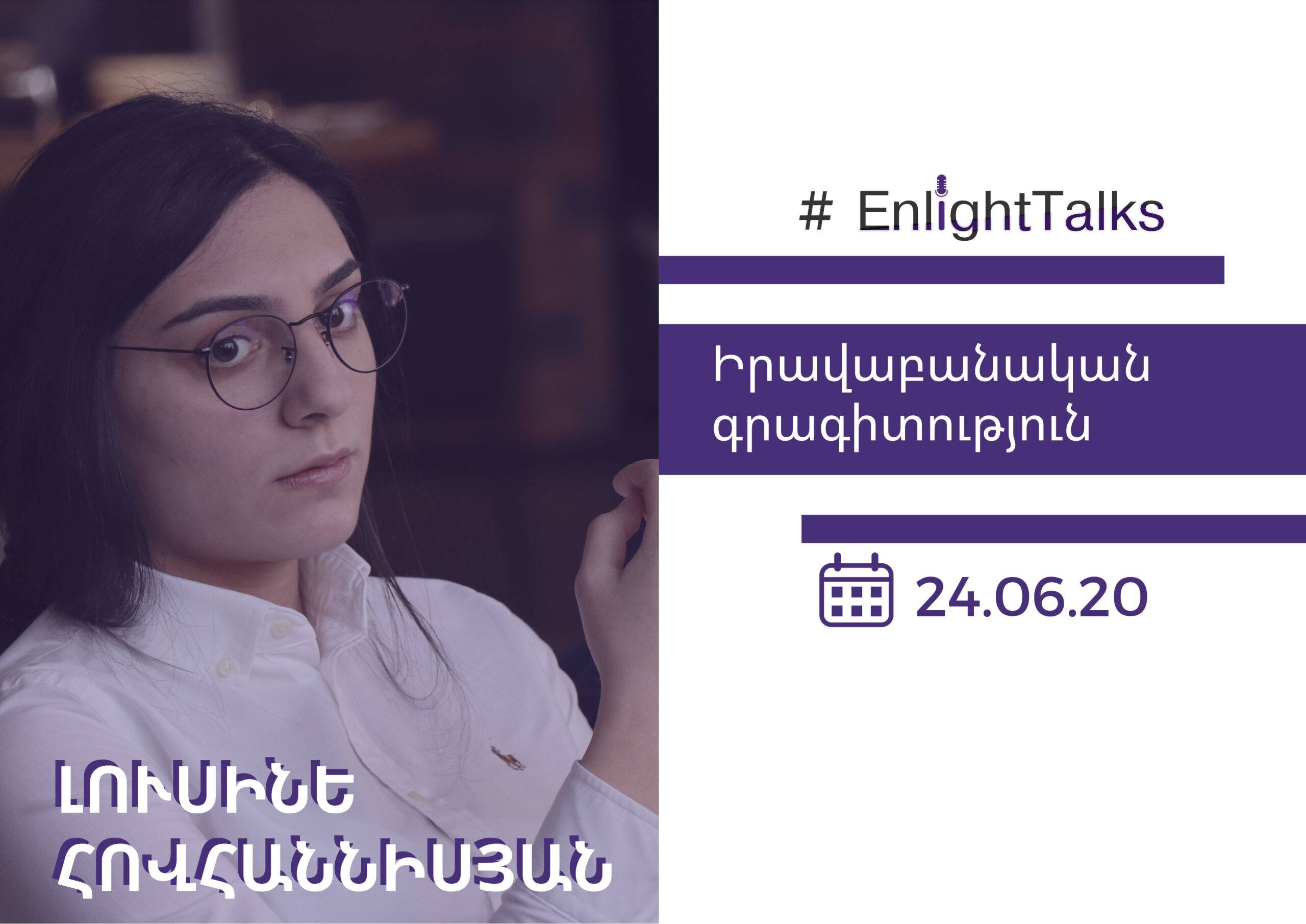#EnlightTalks series within the framework of “Enlight” three-month analytical internship program.
On June 24, within the framework of analytical practice, Lusine Hovhannisyan, who is the board secretary and analyst of “Enlight” and lawyer by profession, held a discourse on “Legal Literacy”. Lawyer Anush Poghosyan also joined the discourse on her initiative. Firstly, the speaker emphasized the modernity of legal literacy and noted that the participants would try to imagine the essence of the so-called legal literacy as a result of discussing several situations. Those are situations that are strictly conventional and cause dilemmas
1st situation: In the case of technical problems, the train driver will kill 10 people on the rails at that moment if he turns right, and 1 person if he turns left.
2nd situation: The doctor can save the lives of 6 seriously injured people by using the organs of 1 patient with relatively light injuries.
These situations seem to be similar where in both cases you have to choose between saving a lot or a small number of lives. However, there are nuances that create different views on these seemingly similar situations.
In the first case, the participants preferred to save the 10 by sacrificing the first. The speaker mentioned that in case of this choice works the principle of the “greater good”, that is, the interest of the majority is put in the first place. And the right is created to make public coexistence as tolerable as possible for everyone.
In the second case, participants opposed the idea of sacrificing the one and using his organs in order to save the other six. In one case, the choice was based on the right to life, in the other case, the fact that these people were not in equal situations was put forward.
The speaker mentioned that this is a similar choice that a lawyer makes daily, and the so-called legal literacy is how and on what principles the choice is made.
The participants also discussed the famous Judicial Act of 1884, called “The Queen v. Tom Dudley and Edwin Stephens.” In connection with this story, a discussion was held with the participants about the relationship between the principle of right and the law
Lusine also talked about the lack of responsibility in the case of the absence of guilt. As an exception, she brought the example of judging the Nazis, in the absence of the crime of genocide at that time. Also, she emphasized the principle of law, which is not a mechanical formula created by some people, but a living mechanism that has the principles of its work.
Commenting on the essence of legal thinking and literacy, she mentioned that although the law is generally in the common interest, not all the rules are applicable to all cases, because the factual circumstances can be various and unpredictable.
Commenting on the essence of the law, the speaker noted that the right originated as a result of complication of the social relationships and acts as a coordinator of those relationships. One of the important functions of law is the balancing function. The right balances various relations and interests in the society.
Then Lusine spoke about the structure of the legal system in Armenia. She mentioned that what was discussed lies in the basis of the whole legal system. That is, by recognizing the principles of law, one can orient oneself correctly in different fields of law. To sum up, we can say that the basis of legal literacy is the understanding of the main logic by which the legislator is generally guided.
Lusine also added that the laws of the Republic of Armenia can be found on arlis.am, and the court acts can be found on datalex.am. From the point of view of legal literacy, she also found the knowledge of the structure of any legal text, that is, facts, right, analysis, conclusion important.
In this part of the discourse, the participants got an assignment to substantiate the point of view opposite to their views on the discussed situations within 1-2 pages.
In the final part of the meeting, Lusine answered the participants’ questions. The questions referred to the structure of the arlis.am website and legal acts, statute of limitations for offenses and the peculiarities of juvenile imprisonment. Anush Poghosyan commented on the institution of reverse force, spoke about the phenomenon of complicity and the mediated crime. The talk was summarized with a question on the procedure of calculating the term of imprisonment, which Lusine explained by the fact that the countries belong to different legal families.
You can get acquainted with Lusine Hovhannisyan’s analytical articles by following this link.
Translator: Marieta Stepanyan © All rights reserved









